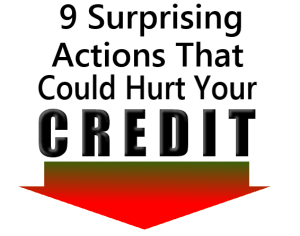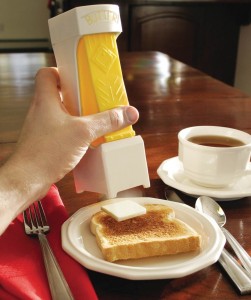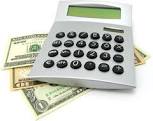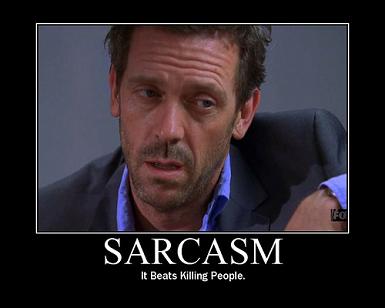
You probably already know all of the obvious actions that could hurt your credit, like paying bills late and defaulting on loans. However, your credit is a funny thing. It can be affected by a number of factors, some of which are a bit surprising.
Think you’re doing everything right when it comes to your credit? Maybe not….
Here’s a list of nine surprising actions that could hurt your credit.
1. Not Paying Your Utilities
If you’ve looked at your credit reports, you’ve probably noticed that utilities, such as electric service and natural gas service, don’t typically appear on them. This is the case when it comes to utility bills that you pay on time.
However, if you don’t pay a utility bill could hurt your credit. If the bill goes unpaid for a while, a utility company will turn it over to a collection agency. And, as we all know, collections on your credit report will hurt your credit.
2. Renting a Car
Renting a car won’t always hurt your credit, but in some cases it could ding it. Some rental car companies will run a hard credit check on you, if you reserve or pay for a car rental with a debit card instead of a credit card.
Before renting a car with a debit card, ask the rental car company if there will be a credit check run. If there will be, use a credit card if possible, since a hard inquiry on your credit report could slightly lower your credit score.
3. Closing a Paid Off Credit Card
Once you get a credit card paid off completely, you might be very tempted to close it completely. This isn’t usually a good idea, though.
Closing a credit card account lowers the amount of available credit that you have. When this happens, it may look as though you have more debt than available credit, which can lower your credit score. In general, the more available credit you have, the better your credit score. However, if an open credit card is costing you a big chunk of money in annual fees, you may want to consider closing them.
4. Not Using your Credit Cards
When you pay off a credit card, you shouldn’t close it, since that could hurt your credit score. So, you should just keep it in your wallet and never use it, right? Not necessarily.
If you go a long period of time without using a credit card, the credit card company may close your account on their own. To avoid this, charge just a small amount of money each month and pay off the balance of the card before it’s due each month.
5. Financing Furniture
One of the easiest ways to buy new furniture is to take advantage of in-house financing. However, it’s also one of the actions that could hurt your credit score, even if you make timely payments.
Some furniture stores finance furniture for consumers, they open a line of revolving credit, which is similar to a credit card. When this happens, you basically charge the amount of the furniture to an account with the same credit limit. For instance, if a new living room set is $3,500 and you finance it, it could appear as though you maxed out a revolving credit account, which will hurt your credit score until you pay down the balance.
6. Not Paying Parking Tickets
You might not agree with that parking ticket, but it doesn’t mean that you shouldn’t pay it. When you don’t pay a parking ticket or similar infraction, many municipalities will now attempt to collect the fine by turning it over to a collection agency. This, of course, could hurt your credit.
7. Not Returning Library Books
It can be hard to remember to return library books on time, but this might help. Those forgotten library books on your shelf could actually hurt your credit score.
Like municipalities that attempt to collect parking ticket fines, some libraries are also turning to collection agencies in order to get reimbursed for late fees and the cost of missing books.
8. Not Diversifying Your Accounts
You might have an installment loan or two that you religiously pay every month, but even then your credit might not be as good as it could be.
One of the things that could hurt your credit, albeit in a small way, is not having different types of accounts on your credit report. You should have a mix of installment accounts, like loans, and revolving accounts, like credit cards, for the best possible credit. However, this doesn’t mean that you should open a new credit card or get a loan just to diversify your accounts, especially if you can’t afford it. The impact that this actually has on your credit is insignificant compared to opening new accounts that you can’t afford.






